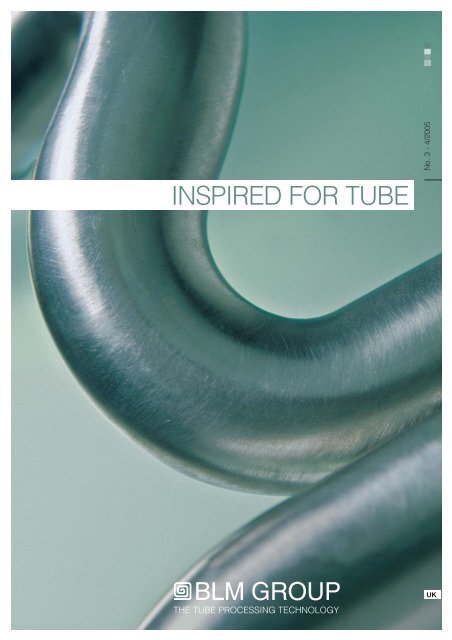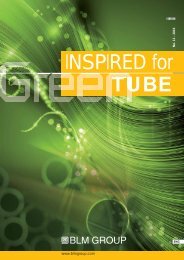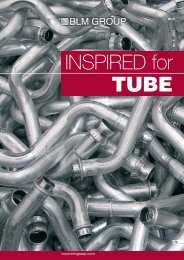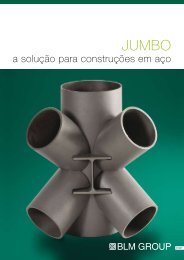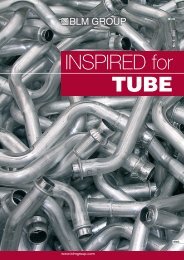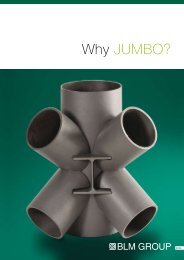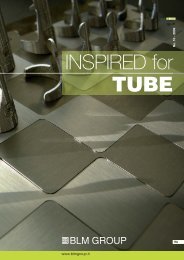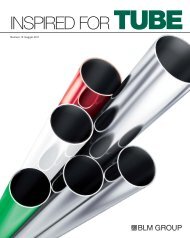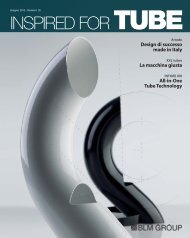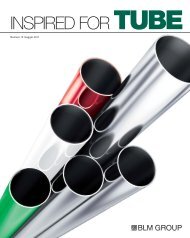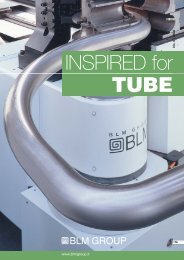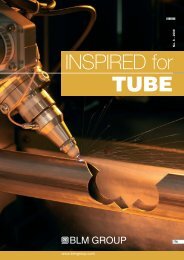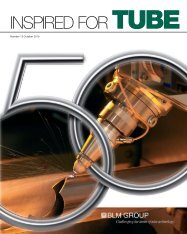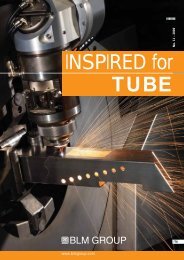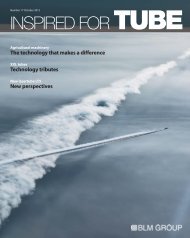Issue n. 3 - April 2005Download pdf - BLM GROUP
Issue n. 3 - April 2005Download pdf - BLM GROUP
Issue n. 3 - April 2005Download pdf - BLM GROUP
Create successful ePaper yourself
Turn your PDF publications into a flip-book with our unique Google optimized e-Paper software.
INSPIRED FOR TUBE<br />
No. 3 - 4/2005<br />
UK<br />
THE TUBE PROCESSING TECHNOLOGY
Contents<br />
INSPIRED FOR TUBE<br />
Contents<br />
Also available in <strong>pdf</strong> format on:<br />
www.blmgroup.com<br />
INSPIRED FOR TUBE<br />
4<br />
Bending and endforming - Contract Manufacturing<br />
The ability to provide<br />
unique solutions<br />
6<br />
Lasertube - Furniture<br />
Creating laser work programmes<br />
8<br />
Bending and endforming - Automotive<br />
To win against the odds!<br />
10<br />
Lasertube - Construction<br />
Flexibility and Personalised<br />
Manufacture<br />
12<br />
Cut-off and end machining - Sub-Contracting<br />
Being competitive without sacrificing<br />
added value<br />
14<br />
Traning - Event<br />
Real co-operation between the<br />
academic world and industry<br />
INSPIRED FOR TUBE<br />
2<br />
Edited by:<br />
<strong>BLM</strong> <strong>GROUP</strong><br />
Communication<br />
Emanuela Colombo<br />
Antonio Farese<br />
Cristina Guzzetti<br />
e-mail: pr@blm.it<br />
tel. +39 031 7070 200<br />
Produced by:<br />
<strong>BLM</strong> <strong>GROUP</strong><br />
Via Selvaregina 30<br />
22063 Cantù (CO) Italy<br />
www.blmgroup.com<br />
Number<br />
INSPIRED FOR TUBE<br />
Nr. 3 - 04/2005<br />
Graphic Design<br />
Studio Grafico Page<br />
Vincenzo De Rosa<br />
Fabrizio Santini<br />
Printed by:<br />
arti grafiche maspero<br />
fontana & c. spa<br />
Cermenate (CO)<br />
Photography:<br />
Aeffe<br />
Weland<br />
Reproduction of all or part of<br />
articles or illustrations published<br />
in this edition cannot<br />
be used without prior authorisation.
Opinion<br />
At the beginning of the 1900’s, FORD rose to be<br />
the market leader in vehicle production because it<br />
became the most efficient and the quickest in its<br />
methods, thanks to an organisation based on a rigid<br />
hierarchy, specialised working functions and sub<br />
division of its manufacturing operations. Its success<br />
is not only demonstrated in its sales figures but also<br />
by the fact that, today, it is still the dominant operational<br />
model for everyone else. Ask anyone in the<br />
automotive industry who worked then and they<br />
would say: the most important elements<br />
of manufacturing are production<br />
capability and purchasing.<br />
This response indicated contemporary<br />
feelings about functionality and<br />
hierarchy.<br />
This organisational model worked<br />
well in the climate of little change and<br />
little complexity that existed in the<br />
Twenties: FORD produced 2 million<br />
Model T’s a year, almost all of them<br />
identical. Today that’s not possible<br />
– supply, in general, is geared to demand<br />
and has had to satisfy nearly<br />
every specific requirement in a much<br />
more concise fashion than before<br />
and with a considerable growth in the variety of options.<br />
In the United States today, with production<br />
volumes many times greater than those of the Twenties,<br />
the most-sold model does not sell more than<br />
300,000 per annum in tens of different versions.<br />
The spread of international market competition into<br />
very different and large geographical regions has<br />
brought considerable change and diffusion of technologies<br />
unthinkable only 50 years ago. Television<br />
has taken 40 years to spread across the eastern<br />
world, the cellular phone less than ten.<br />
In this context, the only companies that survive<br />
are those who rapidly adapt to their customers<br />
needs and can react to the changes necessary the<br />
quickest. It is extremely important for the successful<br />
manufacturer to understand fully their clients’ objectives<br />
and businesses in order to generate the<br />
maximum value for their clients products. This is<br />
horizontal value flow, from purchasing to production<br />
to delivery; a traditional company, on the other<br />
hand, has a vertical structure with a clear separation<br />
between its diverse operations.<br />
For example, the creation of a product like the wireless<br />
telephone occurs when someone realises their<br />
own specific task, often for a fee, and then passes<br />
the idea on to the next stage. No-one is responsible<br />
overall from beginning to end of the process;<br />
no-one can guarantee the coherence of the prior<br />
choices made during this process and no-one has<br />
the complexity of vision necessary<br />
to properly realise the value of the<br />
product.<br />
Process management revolutionises<br />
this approach and gives<br />
more initial consideration to the<br />
process of value generation and to<br />
the final result for the client, not to the<br />
performance of an isolated operation.<br />
This generation becomes the<br />
company fulcrum; because it adds<br />
value while the individual operations<br />
support one or more of the processes,<br />
it means that the resources and<br />
competency necessary to improve<br />
the product still further can be made<br />
available. Quality certification such as Vision 2000<br />
has adopted this approach but many companies<br />
have simply changed some parameters without<br />
changing their organisation thus limiting their performance.<br />
True process management requires<br />
the institution of new roles for production responsibility<br />
and the modification of others such as operation<br />
responsibility. These changes will take time<br />
and will be exhausting as operational changes<br />
knock down barriers and create improvement. The<br />
elimination of these barriers to progress, a more integrated<br />
functional dependence and attention<br />
to the value added process for their clients will<br />
be the winning model for our companies in their<br />
fight to be truly competitive.<br />
Alberto Portioli Staudacher<br />
Department of Engineering Management<br />
Milan Polytechnic<br />
INSPIRED FOR TUBE<br />
Alberto Portioli Staudacher is Professor of Operational<br />
Management, Logistics and Production Systems at Milan<br />
Polytechnic. From 1995 to 2002 he was President of the Association<br />
of Production Management Graduates, and from<br />
2000 he has also been a Member of the Board of Engineering<br />
Management.<br />
From 2001 he has been Director of the SMART Laboratory<br />
in Operations and Supply Chain Management and from 2003<br />
a Member of the teaching staff for the Doctorate in Production<br />
Management. He is the author of three books and over<br />
60 scientific articles for conferences and national and international<br />
magazines. He has given advice and been involved<br />
in training and consultative activities for many Italian<br />
and European companies in organisation and process<br />
allocation techniques. He has been involved and assisted<br />
<strong>BLM</strong> <strong>GROUP</strong> for many years.<br />
3
R-MAN, Sweden, celebrate their 25th<br />
Anniversary this Year<br />
INSPIRED FOR TUBE Contract Manufacturing<br />
The ability to provide<br />
unique solutions<br />
Boris Bergkvist is celebrating the 25th anniversary<br />
of R-MAN this year. The company has its<br />
headquarters in Värnamo in Sweden and specialises<br />
in contract manufacturing for tubular components.<br />
It has developed considerable experience<br />
in tube applications and has an unusual<br />
capacity for solving the problems of tube forming,<br />
however complex.<br />
Tube working is in Mr Bergvist’s DNA; he began<br />
his career in 1963 by working for a company producing<br />
equipment for tube bending and endforming.<br />
This experience forms the bedrock of R-<br />
MAN’s activities as he has accumulated the<br />
know-how in dealing with tube forming problems<br />
from the inside.<br />
ness is in the automotive industry which accounts<br />
for some 60% of our turnover (Volvo Trucks and<br />
Scania) ; we also supply copper components for<br />
wall mounted heater boilers and steel parts for refrigerators,<br />
medical equipment and mobility products<br />
for the handicapped.”<br />
The Swede is a major force in the market place<br />
in which R-MAN has become an important player<br />
and an ideal partner when tube working is required.<br />
The company is now involved from the initial<br />
development phase right through to product<br />
prototyping. “ Our experience always enables us<br />
to find the proper balance between technical solutions,<br />
ideal production methods and economic<br />
costing,” he continues.<br />
An ideal partner for tube<br />
“ R-MAN is a tube working contractor and necessarily<br />
gets involved with many different industrial<br />
sectors” states Mr Bergkvist. “Our core busi-<br />
Fixed and variable radii bending<br />
A look inside the R-MAN factory shows eleven<br />
tube bending machines, several end forming systems<br />
with high degrees of automation and diverse<br />
4
numbers of robotic welding cells. Near each machine<br />
are bent tubes of differing shapes, sizes<br />
and complexity, which amply demonstrate the variety,<br />
and depth of the tube working solutions on<br />
offer.<br />
“In the last few years, we have purchased a number<br />
of <strong>BLM</strong> tube bending machines which have enabled<br />
us to develop an increasing number of unique<br />
engineering solutions, “ states Mr Bergkvist.<br />
Today there are two <strong>BLM</strong> PLANET bending, endforming<br />
, cutting and punching machines with<br />
material fed directly from coil (for boiler heater applications);<br />
a <strong>BLM</strong> SWING CNC bending machine<br />
with left and right hand bend capability<br />
up to 32mm diameter and the <strong>BLM</strong> Dynamic 4<br />
with similar right and left bend flexibility but with<br />
a larger capacity of up to 42mm diameter.<br />
“ The capability of being able to use fixed and<br />
variable radii bending in the same work cycle without<br />
any limitation on the complexity of the piece,<br />
“ concludes Mr Bergkvist, “ This has enabled us<br />
to compete in new markets and develop new<br />
products which continue to be both competitive<br />
and innovative – for example, in the medical equipment<br />
sector which employs many elements with<br />
complex curves.<br />
The new tube working technologies have given<br />
fresh impetus to our creativity in being able to offer<br />
unique answers to production problems.”<br />
Number 3 - april 2005 INSPIRED FOR TUBE Contract Manufacturing<br />
5
Laser tube cutting technology gives major benefits in the manufacture<br />
of furniture and accessories for the music and home entertainment industry.<br />
Creating laser work programmes<br />
INSPIRED FOR TUBE Furniture<br />
TAM srl from Recanati are a manufacturer strongly<br />
geared to exports with over 95% of their production<br />
going abroad. The two main product lines<br />
are furniture for home entertainment systems (audio<br />
and visual) and musical instrument accessories<br />
(stands, studio-desking etc). Every detail of their<br />
product is made in their factory, complying with the<br />
“Made in Italy” design requirements. They use top<br />
quality materials and innovative technology such<br />
as, laser-tube cutting and high-definition paint plant.<br />
These technologies guarantee total-productioncontrol<br />
and a high standard of finish, particularly for<br />
their Home Theater range, where the product appearance<br />
is of paramount importance.<br />
80% of the tube is processed by laser<br />
Laser technology clearly defines TAM production<br />
programmes for cutting tube; they currently use<br />
three ADIGE Lasertube systems.<br />
“The first system, “states Sergio Graciotti”, was purchased<br />
in 1998/99, and in the last 5 years two further<br />
Adige Tube Laser systems have been added.<br />
Now, over 80% of all the tube processed monthly<br />
(150 tonnes) is machined by laser.”<br />
Once the increases in production and process improvements<br />
became so clear on the first Adige<br />
Laser it became a very straightforward decision for<br />
the next two to be purchased. For example, on the<br />
Home Theatre production line, the quality and flexibility<br />
achieved by the laser has provided considerable<br />
benefits with a subsequent increase in the<br />
number of parts produced rising from 1000 parts<br />
per annum to 60,000.<br />
A bigger contribution<br />
The laser’s massive contribution has been felt by<br />
TAM in design flexibility and working practices, safety<br />
and, above all, in the quality of product. The laser<br />
systems produce a finished product in a fraction of<br />
the former time and without the 5 or 6 traditional<br />
machining processes they previously carried out<br />
i.e. sawing, drilling, notching, milling, punching, deburring<br />
etc.<br />
“Machining our tube is now consistent and to the<br />
highest degree of repeatable quality, “ underlines<br />
Graciotti, “ the components are more accurate enabling<br />
us to introduce robotic welding cells alongside<br />
the ADIGE systems. The repeatable accuracy<br />
of the laser with the robot welding process<br />
ensures the most precise fit-up of the tubular assembly,<br />
which magnifies the overall aesthetic of the<br />
final product. The use of the lasers has also helped<br />
us to achieve much more precise matching and<br />
jointing of parts which has simplified or in some cases<br />
eliminated welding jigs and fixtures.”<br />
The complete item in 10 minutes<br />
TAM has also eliminated the entire pressing, punching,<br />
and shearing operations previously carried out,<br />
significantly improving aspects of safety and reducing<br />
manning levels.<br />
The laser system has, in fact, made the cycle of a<br />
product’s development much leaner - “ Today, it’s<br />
possible to have a newly designed part completed<br />
and in your hand, 10 minutes after initialising the<br />
laser programme, “confirms Mr Pirchio, the Vice<br />
President of the company. “ Before, there were a<br />
6
considerable number of technological limitations to<br />
the traditional methods we adopted. Today, not only<br />
is it possible to complete the product more quickly,<br />
but we are able to do it without needing several<br />
dedicated machines and associated special tooling.<br />
We have completely transformed our original<br />
mentality and are beginning to realise the magnitude<br />
of the benefits we can enjoy with the laser in<br />
terms of the design, functionality, manufacture and<br />
overall aesthetics of our products; experimenting<br />
with the ADIGE systems has without doubt acted<br />
as a spur to the development of new products.”<br />
“ The designer,” adds Mario Malizia, the President<br />
of TAM, “can deliver his creative designs, without<br />
the restrictions of traditional machining processes,<br />
which in turn can be further improved using our own<br />
know-how, gained from our experience with the<br />
laser tube and the tube benders.”<br />
In the factory today, elliptical and semi oval tube are<br />
the starting point for virtually all new products, this<br />
change has led to a new product range, which combines<br />
laser tube cutting technology and variable<br />
radius tube bending technology, enabling us to<br />
reach heights of functionality and beauty in our products,<br />
hitherto impossible.<br />
Concludes Pirchio, “ there has been constant<br />
product improvement in both design and functionality,<br />
which has led to a considerable reduction<br />
in manufacturing time – this has opened up<br />
the development of a sub-contracting laser tube<br />
cutting service, which brings in a very welcome<br />
additional income.”<br />
Number 3 - april 2005 INSPIRED FOR TUBE Arredamento<br />
7
Relem, Spain, the automotive component specialist, meets zero defect<br />
requirements demanded by quality standards<br />
To win against the odds!<br />
INSPIRED FOR TUBE Automotive<br />
Challenges in the automotive sector for RELEM<br />
S.L. from Granollers in the Spanish region of Catalonia<br />
are always pressing and particularly so in<br />
the highly competitive tube-working environment<br />
in which they operate. The automotive component<br />
specialists have developed production technologies<br />
which have enabled them to face the<br />
stringent requirements of the quality standards<br />
needed to meet the need for “zero defects” which<br />
are experienced by all automotive product manufacturers<br />
and their sub contractors.<br />
RELEM are a member of the PAVER Group and<br />
are a medium sized company employing 110 personnel<br />
with a turnover of 12.5 million in 2004. They<br />
manufacture tubular components for windscreens<br />
(40%), air conditioning units (20%) and car seating<br />
(30%). A number of other components make<br />
up the remaining 10%. The current division in<br />
product manufacture has shifted from the more<br />
traditional markets of structural tubular components<br />
and fluid line parts. Principal clients are<br />
among the most noted names in the industry and<br />
include Robert Bosch, Dayco, and Ensa in many<br />
different global locations such as Portugal, Germany,<br />
Mexico and Brazil as well as their own domestic<br />
market in Spain.<br />
8
From 500 to 300,000 parts per annum<br />
“All the tube working machines purchased by<br />
RELEM have been supplied by <strong>BLM</strong>. There have<br />
been very rapid technical variations in our manufacturing<br />
programme and the machines have<br />
enabled us to adapt to the changes required and<br />
still remain competitive” stated Andrés Palau, the<br />
company’s joint owner. He added, “The production<br />
technology available from <strong>BLM</strong> has integrated<br />
totally with the characteristics of our manufacturing<br />
systems”.<br />
“We produce support tubing for windscreens on<br />
the <strong>BLM</strong> DYNAM0 and <strong>BLM</strong> NC832 tube bending<br />
machines; these parts look simple to produce<br />
but require high degrees of accuracy and repeatability.<br />
On the <strong>BLM</strong> Planet CNC tube bender<br />
we manufacture, in aluminium tube, components<br />
for automotive air conditioning units. Working<br />
directly from coil stock (which provides significant<br />
material scrap reductions), then combining –<br />
straightening, end-forming, bending, final cut-off<br />
and unloading of the finished component – on<br />
one machine, in a fully automated and continuous<br />
process, achieves the lowest possible costper-component.<br />
Production batches...<br />
The needs of the automotive sector have a huge<br />
influence on production programmes and RELEM<br />
have always looked for the best possible solutions;<br />
very strict tolerances, high value materials<br />
(stainless steel and aluminium), an ability to work<br />
with pre-assembled tube and total quality control<br />
over all the parts being worked.<br />
“An important element, in our constant search for<br />
efficiency in technology and the production<br />
process, is our collaboration with the <strong>BLM</strong> Group,<br />
who have a global vision of the automotive market<br />
and can supply advanced technologies for<br />
tube working processes as well as the support of<br />
properly qualified personnel all the time.”<br />
To win against the odds<br />
“The availability and reliability of the machines<br />
is paramount,” Andrés Palau continues,” in a situation<br />
where our clients can give us an order at<br />
8.00 a.m. by internet and expect it to leave the<br />
factory by 11.00 a.m. the same morning. Not all<br />
our customers are this demanding, obviously –<br />
but it’s upon the most difficult requests that we<br />
measure our performance.”<br />
“We have a high level of competence and experience<br />
in our factory which helps us to confront<br />
the requests which pose particular problems. We<br />
are able to manufacture our own tooling and ensure<br />
they are as perfect as possible. This is equally<br />
important for the automation and control of the<br />
production processes.”<br />
“Once we’ve got over these particular problems,<br />
we have to start all over again with another request.<br />
It’s this environment that stimulates us and<br />
helps us win against all odds.”<br />
Number 3 - april 2005 INSPIRED FOR TUBE Automotive<br />
9
Weland, Sweden, production is based exclusively on laser technology<br />
and cutting process automation<br />
INSPIRED FOR TUBE Construction<br />
Flexibility and Personalised<br />
Manufacture<br />
When Mr Welansson founded Weland AB in Smalandsstenar,<br />
Sweden in 1947, it was immediately<br />
successful and now the company has grown into<br />
a group of 25 different companies employing 800<br />
people with a turnover of 170 million last year. This<br />
growth and marketing success has been realised<br />
by developing products tailored to customers’ needs<br />
and delivering them in as quickly as possible and<br />
at a competitive cost. There are three main production<br />
lines: staircases for both internal and external<br />
use, metal railings, and ramps for use inside<br />
and outdoors. The group’s main markets are in central<br />
and northern Europe and in North America.<br />
There has also been a significant growth in subcontract<br />
work separate from their normal product<br />
range in the tubular furniture, automotive and security<br />
sectors.<br />
product costing are a fact of their commercial life.<br />
This is further complicated by the fact that, although<br />
Weland are a large company operating in an industrialised<br />
country like Sweden, there are few opportunities<br />
for sales in their native land.<br />
These apparently conflicting factors have actually<br />
come together and enabled Weland to improve and<br />
grow by using new technology with their production<br />
now based exclusively on laser technology and<br />
automation of the cutting process.<br />
They currently use five ADIGE LASERTUBE cutting<br />
systems and two combined units for sheet and tube<br />
supplied by ADIGE SYSTEMS to achieve the match<br />
of the necessary flexibility and tailored product that<br />
their overall strategic plan demands.<br />
Seven <strong>BLM</strong> Group laser systems<br />
Weland products, by their very nature and use in<br />
houses, apartments, urban furniture and industrial<br />
fabrication, are hardly ever standard. Giving personalised<br />
services, fast deliveries and economic<br />
Standard and customer designed products<br />
Lars Bredenfeldt, Weland’s Purchasing Director<br />
and Rune Berndtsson, the Production Director<br />
both confirm that the maximum time available to<br />
them from placing the order to despatch is four<br />
10
weeks. They develop and plan the design and<br />
the machining program by CAD and then send it<br />
all to the shop floor. In order to retain flexibility they<br />
plan some components in advance which are relatively<br />
standard and put them into stock ( e.g. the<br />
treads in a spiral staircase) and also have to manufacture<br />
some items made to measure (overall<br />
height, dimensions of the balustrades etc) In the<br />
case of an external staircase, these can vary up<br />
to 250m in height.<br />
The tubular components present in these structures<br />
carry the weight and there are many of them in a<br />
single staircase, slotting together just like Lego® -<br />
Weland actually supply their products in kit form for<br />
construction at the building site or in the home.<br />
A decisive choice<br />
Flexibility in design and production and speed of<br />
execution are fundamentals and the decision to buy<br />
five LASERTUBEs from ADIGE was decisive in being<br />
able to guarantee the repeatability and rapidity<br />
the company requires and also to look at manufacturing<br />
options not available to them before. Lars<br />
Bredenfeldt and Rune Berndtsson express considerable<br />
satisfaction in the purchasing choices<br />
they made and for the results obtained every day<br />
for five years, three shifts per day. “ The ADIGE systems<br />
are affordable, simple to use, don’t require a<br />
lot of set-up or changeover time and are supported<br />
by easy and quick-to-programme CAD/CAM<br />
software. Equally valid is the comprehensive initial<br />
training we received from ADIGE.”<br />
Time to diversify<br />
Weland AB have now further improved their production<br />
and have developed a fine understanding<br />
of the techniques used on the LASERTUBE machines.<br />
They are now able to offer sub-contracting<br />
services with the additional time saved from this<br />
knowledge and this is extremely important to them.<br />
For example, they cut 100mm x 100mm x5mm<br />
tubes for Scania, the well known truck manufacturer<br />
with a high degree of consistency and quality that<br />
they were not able to do with traditional methods<br />
(drilling, milling, mitre-cutting, deburring etc).<br />
Number 3 - april 2005 INSPIRED FOR TUBE Construction<br />
11
UNI-MECC, Italy, consistently achieves optimum performance and maintains<br />
competitiveness with their ADIGE CM502 Sawing and Machining Centres<br />
INSPIRED FOR TUBE Sub-Contracting<br />
Being competitive without sacrificing<br />
added value<br />
The mechanical engineering company, UNI-<br />
MECC srl, from Villanova near Turin, began in<br />
1990because its founders Roberto Bruneri and<br />
Venanzio Peinetti believed that there was a<br />
healthy demand for the production of quality<br />
bushes for shock absorbers, anti vibration<br />
mountings and spacing collars for the automotive<br />
sector, earthmoving equipment and industrial<br />
vehicles.<br />
Today the company has become a benchmark<br />
in the industry for the production of bushes and<br />
spacers in steel and other metals; they produce<br />
1.4 million components a month with 50% exported<br />
to Germany (and some to the USA)<br />
where they go to complete finished components<br />
for the well known German marques: Audi, Mercedes<br />
and VW.<br />
From 2 hours down to 45 minutes<br />
With ever increasing production demands, one<br />
of the prime objectives for UNI-MECC was to<br />
rationalise its operations to ensure it maintained<br />
its competitive edge without sacrificing added<br />
value.<br />
“The ADIGE CM502 machining centres, “ states<br />
Fabio Rui who is responsible for the production<br />
and quality levels of the company,” have helped<br />
us maximise our output with increases in production,<br />
quality and a decrease in downtime<br />
during product changeovers. The first CM502<br />
was installed in 2003, the second arrived in 2004<br />
and we immediately began double shift production.<br />
The most important benefits are in production<br />
changeovers that have been reduced by 200%;<br />
12
down from 2∏ hours to 45 minutes. Other benefits<br />
include the cutting speed for thick-wall tube<br />
which, thanks to the ADIGE CNC control system<br />
determining the cutting parameters automatically,<br />
gives lower cycle times.”<br />
To achieve one’s expectations<br />
“ Also from a quality point of view,” Rui goes on,<br />
“ we have increased our levels of performance<br />
and expectancy; with in-line monitoring and<br />
control of all the parts produced, we have a<br />
guarantee of consistency within the design tolerances.<br />
This control is equally important for the<br />
internal integrity of thin wall tubes. Equally beneficial<br />
is that the components come off finishmachined<br />
and clean, needing no further operations.<br />
UNI-MECC’s clients are extremely demanding<br />
and ask for total quality control down to tolerances<br />
of ±0.025mm. For this reason, the company<br />
rigorously employ the in-line inspection<br />
system incorporated in the ADIGE CM502 machining<br />
centres and for some parts (the thin wall<br />
tubes) inspect the internal component quality<br />
once again as an in-line process.<br />
Rui, who is responsible for quality control, emphasised<br />
with pride “ We have ISO 9001 –2000<br />
certification and we keep to the highest attainable<br />
limits of the standard for our very demanding<br />
customers. Our production decisions<br />
reinforce this logic. We are known for our quality,<br />
attention to specification and delivery times,<br />
which our customers really appreciate.”<br />
Number 3 - april 2005 INSPIRED FOR TUBE Sub-Contracting<br />
13
ADIGE, together with six other Trento companies, have participated<br />
in an experimental education programme<br />
Real co-operation between the<br />
academic world and industry<br />
INSPIRED FOR TUBE Event<br />
Integration between the teaching profession and<br />
industry has always been one of the ambitions of<br />
the <strong>BLM</strong> <strong>GROUP</strong>. When ADIGE, the Trento based<br />
member of the group, had the chance to carry out<br />
such a project, they didn’t let the opportunity slip.<br />
ADIGE, together with six other Trento companies,<br />
have participated in an experimental education programme<br />
devised by the Trento Provincial Council<br />
Training and Education Service in conjunction with<br />
ENAIP , the Trento -Villazzano Professional Training<br />
Centre.<br />
This project, which is ongoing, is open to students<br />
at the end of their usual three year degree course<br />
at the Professional Centre and consists of a further<br />
year of specialisation with truly innovative features:<br />
all the training activity for the scholastic year<br />
has been developed by the ENAIP Centre in consultation<br />
with the firms involved with a constant rotation<br />
of ideas between the academics and the commercial<br />
companies. This has had profound effects<br />
upon the company students and they have now<br />
become accustomed to this method of teaching.<br />
Industrial Maintenance<br />
The planning of the project began in June 2003<br />
when, after a proposal from the Provincial Council,<br />
all involved agreed on a definition of the profile<br />
needed: an INDUSTRIAL MAINTENANCE TECH-<br />
NICAN who would be a professional figure who was<br />
specialised in the maintenance of industrial automation<br />
equipment encompassing electrics, electronics,<br />
pneumatics and hydraulics.<br />
This was envisaged as a combined mechanical<br />
and electronics engineering engineer, a “Mecca-<br />
14
tronico” figure who possessed a clear understanding<br />
and interest in the maintenance sector and specifically<br />
for the activities of Technical Assistance, Assembly,<br />
Installation and Testing which are its predominant<br />
features.<br />
The “college in the company”<br />
ADIGE embraced this initiative with enthusiasm correctly<br />
understanding that it would be a good investment<br />
in training specialised personnel with multi-discipline<br />
characteristics. Because of this, the<br />
company has collaborated actively to find competent<br />
professionals to develop, and at the same time,<br />
to be involved with the content of the pilot scheme.<br />
They participated directly, together with the ENAIP<br />
lecturers, in the selection of candidates and personally<br />
introduced two students who, at the start of<br />
the scheme, had little idea that they would now,today,<br />
be working in the company as fellow employees.<br />
ADIGE believe strongly that the rotation of ideas<br />
and opinions between the academic world and their<br />
own is fundamental and they are very conscious of<br />
the fact that experiences of this type produce positive<br />
results which have a “trickle down” effect: for<br />
the students , first of all, who can more properly understand<br />
in practice what they have learned in theory,<br />
and also for the colleges who see the real value<br />
of their work.<br />
This really is a “college in a company” where both<br />
commercial concern and academic college are<br />
“arm in arm” Opinions on the success of the initiative<br />
are very positive, both from the lecturing staff at<br />
the Professional Training Centre and from the companies<br />
taking part in the scheme. The real significance<br />
of the programme and its initial success is<br />
that the scholastic/working year has now not only<br />
inaugurated a second course for the industrial maintenance<br />
technician scheme but has announced<br />
two new courses for technician courses geared<br />
to electronics and electrics. What more needs to<br />
be said? Compliments to all concerned!<br />
Number 3 - april 2005 INSPIRED FOR TUBE Event<br />
15
INSPIRED FOR TUBE<br />
TUBE BENDERS<br />
TUBE END FORMERS<br />
CUTTING DEBURRING AND WASHING<br />
CUTTING AND END MACHINING<br />
LASERTUBE CUTTING SYSTEMS<br />
LASER CUTTING FOR SHEET AND SHEET&TUBE COMBINED<br />
MATERIALS HANDLING SYSTEMS<br />
3D MEASURING AND INSPECTION<br />
PRODUCTION CELLS<br />
NON CONTACT MEASUREMENT SYSTEMS<br />
PROCESS CONTROL SOFTWARE<br />
Also available in <strong>pdf</strong> format on:<br />
www.blmgroup.com<br />
16<br />
Via Selvaregina, 30<br />
22063 Cantù (CO) Italy<br />
tel. +39 031 7070200<br />
fax +39 031 715911<br />
e-mail: export@blm.it<br />
Via dei Campi, 4<br />
38050 Novaledo (TN) Italy<br />
tel. +39 0461 720007<br />
fax +39 0461 720214<br />
e-mail: sales@adigesystems.it<br />
Via per Barco, 11<br />
38056 Levico Terme (TN) Italy<br />
tel. +39 0461 729000<br />
fax +39 0461 701410<br />
e-mail: export@adige.it


